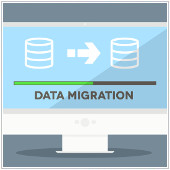Virtualization is as complicated as it is beneficial to SMBs. The concept alone can take time to fully grasp and making it a reality at your company is even more difficult. However, Amazon Web Services needs to make the service as easy as possible if they expect to retain customers and increase their bottom line. […]
 Virtualization is as complicated as it is beneficial to SMBs. The concept alone can take time to fully grasp and making it a reality at your company is even more difficult. However, Amazon Web Services needs to make the service as easy as possible if they expect to retain customers and increase their bottom line. In an effort to make database migrations straightforward and economical, they’ve released a new tool to take care of all the headaches associated with moving your network to a virtualized environment.
Virtualization is as complicated as it is beneficial to SMBs. The concept alone can take time to fully grasp and making it a reality at your company is even more difficult. However, Amazon Web Services needs to make the service as easy as possible if they expect to retain customers and increase their bottom line. In an effort to make database migrations straightforward and economical, they’ve released a new tool to take care of all the headaches associated with moving your network to a virtualized environment.
As a quick review, virtualization is best imagined by visualizing your server as a house. When a user draws computing power from your server, it’s a lot like opening the front door and just telling anyone to come in and grab whatever they need. The house gets crowded and messy quickly. Virtualization allows you to create doorways into partitioned rooms, with specifications and permissions unique to the user or application that needs them.
Much like the house in our analogy, the hardware and upkeep of servers can become quite expensive. By taking virtualization one step further, Amazon Web Services (AWS) has created the equivalent of a gigantic apartment building, online. When renting these internet-based apartments, your SMB is presented with virtualized versions of your server and desktops. You realize huge cost savings by eliminating upfront capital expenditures on hardware, and the rooms and their contents can be modified and adapted with little more than a simple request to AWS.
So you’re ready to migrate your server and clients to a virtualized environment, but after hiring experts you’re informed they will need days -- possibly weeks -- of server downtime to move your data from on-site storage to AWS. This service interruption has long been a massive speed bump in cloud migration projects. With Amazon’s Data Migration Service (DMS), that server downtime can be reduced to as little as 10-15 minutes.
This significantly reduced downtime is achieved by keeping your database live during the migration process. The final product can be stored in one of AWS’s several regional datacenters, or even copied back to your on-site server for concerns about redundancy and continuity.
Another speed bump along the road to your new virtualized home is moving from one database schema to another. Imagine the front door of your original, one-bedroom house is shaped like a triangle. But your destination, the AWS home, has a front door in the shape of a circle -- how will you get your data into its new home? Amazon’s DMS has added a new tool to take care of all of that for you. This means it doesn’t matter if you have an Oracle or MySQL on-site server; Amazon can almost effortlessly convert it to a new schema.
With such a valuable tool, AWS must be charging a fortune to utilize it, right? Wrong. Amazon promises DMS migrations will cost as little as three dollars per terabyte. Even if your business is hosting above average amounts of data on-site, that’s still a price tag any cash-strapped SMB can afford.
Just because there’s a new tool for the migration, doesn’t mean you should attempt buying a new home for your server and driving it across town alone. Think of us as your virtualization real estate agent and movers, all wrapped into one. For an inexpensive, swift migration to a virtualized environment, we’ve got just the place for you. Contact us today.
